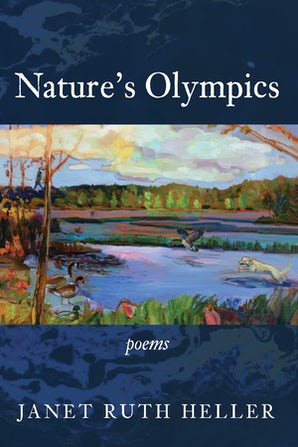The scholarly journal MidAmerica just published Margaret Rozga’s review of my poetry book Nature’s Olympics (Wipf and Stock, 2021). Margaret Rozga is a professor emeritus of the English Department at the University of Wisconsin-Waukesha. MidAmerica focuses on literature of the Midwest, and the editor is Marcia Noe, who teaches liberal arts, international studies, and women’s studies courses for the University of Tennessee-Chattanooga.
Here are Professor Rozga’s comments about my poems in Nature’s Olympics.
Wisconsin-born and University of Chicago-educated Janet Ruth Heller finds inspiration for her poems in the upper Midwest, especially the states that border Lake Michigan. The more distant settings featured in these poems include Arizona and Mississippi, but the travel in this volume most often takes place from Midwestern cities to Midwestern woodlands, rivers, and lakes. The western shore of Lake Michigan provided Heller her early geographic orientation, as the largely autobiographical poem, “Growing Up on the Other Side of Lake Michigan, an Ode,” makes clear. She moved to the east side of the lake for her career as a literature professor at several Michigan universities. She is a past president of The Society for the Study of Midwestern Literature and presently serves as president of the Michigan College English Association.
The poems in Nature’s Olympics are arranged in seasonal sections, beginning with a section of summer poems. Several of them feature a young camper as speaker finding joy in observing wildlife. In the title poem, “Nature’s Olympics,” the speaker sees loons, chipmunks, goldfinches, and hummingbirds in terms of athletes competing in the Atlanta Olympics, that is, diving, dashing, balancing, and flying backwards “like acrobats” (2).
Comparison and contrast structure many of the poems, including “Pyrotechnics, July, 2013.” The first of the two parts of this poem describes the careful, controlled building of a campfire, though the speaker admits to loving “the danger, / the risk of uncontrolled passion” (13). The second part describes not just the potential risk but the actual destructive force of a wildfire in Arizona, which has a sobering effect, stunning the visitors “into silence” (13).
Author of a book of literary criticism about English Romantic writers, Coleridge, Lamb, Hazlitt, and the Reader of Drama, Heller presents in these poems a Romantic view of nature. Comparisons between human and other-than-human nature are at the heart of the book. “Autumn Leaves,” for example, compares the leaves of an ornamental pear tree to “gold coins” and the browned dry leaves of an oak to “my obsessions” (29). The built environment of the city diminishes natural glory, clearly expressed in “Spring in Chicago” where “Skyscrapers mute / the golden trumpet of sunlight” and the “March quickening” brings forth only “partial fruit” (58).
Each of the six haiku-like tercets in “Snow Poem” highlights a point of comparison between the human and another facet of nature. For example, “Cars huddle like moles” and “Fog bites off the heads / of distant buildings / like a hungry dragon.” All of these images, the speaker hoards, she says, like a witch “for my winter brew” (45).
The comparison/contrast strategies work more subtly in the haiku with precise and succinctly rendered images their greatest strength. Each section of the book includes a haiku series, ten each for the summer and fall sections in the first half of the book, and twelve each for the winter and spring seasons that comprise the second half.
Some of the haiku are written in complete sentences, the typical grammatical choice for the collection’s longer, more narrative poems. Among those clustered as “Spring Haiku,” for example, is this one: “We fill the feeder / with corn, but deer / eat our tulips” (61). Here from “Autumn Haiku” is another in similar grammatical style: “Cherry branches / dance in the wind and dangle / black bead necklaces” (26).
Others, including some of my favorites, punctuated with a dash, take a leap to the point of comparison: for example, this summer haiku: “Rift in clouds / pouring light— / waterfall” and from the winter group: “Rabbit tracks flitter / on powder-light snowfall— / butterfly wings” (46). These are poems of keen observation of both the natural world and human emotion.
